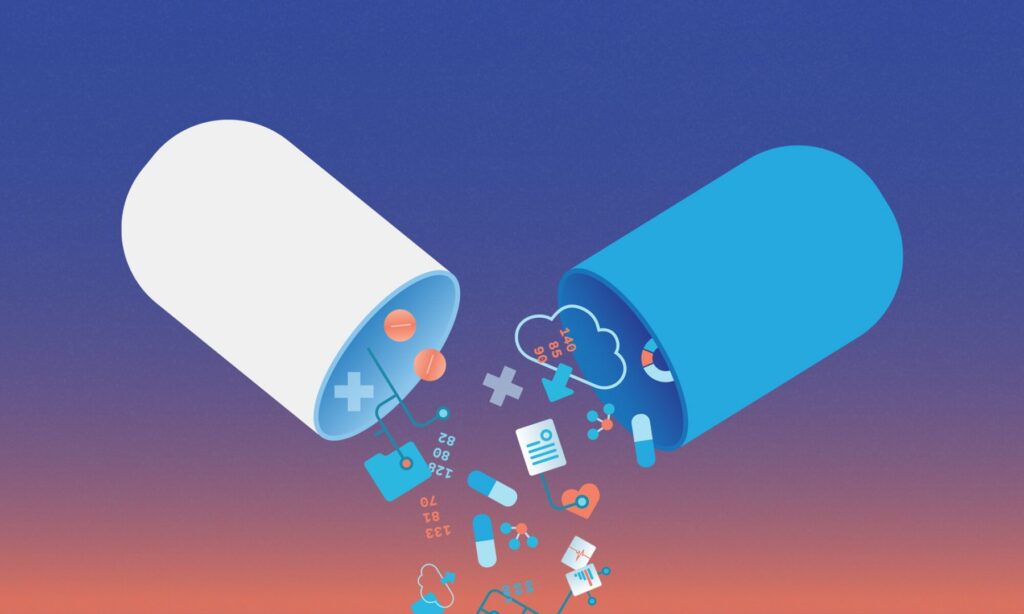Artificial intelligence (AI) is rapidly transforming the landscape of healthcare, ushering in an era of unprecedented potential for improved diagnosis, treatment, and access to medical care. From analyzing mountains of medical data to powering robotic surgeons, AI is poised to revolutionize how we approach health and well-being.
Unlocking the Power of Medical Data

One of the most significant impacts of AI lies in its ability to analyze vast amounts of medical data, including patient records, imaging scans, and genomic information. This data deluge, while valuable, can be overwhelming for human doctors. AI algorithms, however, can sift through this data with unparalleled speed and accuracy, identifying patterns and correlations that would be nearly impossible for humans to detect. This allows for:
- Earlier and More Accurate Diagnoses: AI can analyze patient data to identify subtle signs of disease, enabling earlier diagnoses and interventions. For instance, AI systems are being developed to detect cancers in mammograms and other scans with greater accuracy than human radiologists.
- Personalized Treatment Plans: By analyzing a patient’s unique medical history, genetic makeup, and lifestyle factors, AI can help develop personalized treatment plans. This approach, known as precision medicine, holds immense promise for tailoring treatments to individual patients, improving efficacy and reducing side effects.
- Drug Discovery and Development: AI can analyze vast datasets of chemical compounds and biological information to accelerate drug discovery and development. This can lead to the creation of new medications with fewer side effects and targeted therapies for specific diseases.
AI-powered Tools for Clinicians
AI is not only revolutionizing data analysis but is also empowering clinicians with sophisticated tools to enhance patient care. Some of the key developments include:
- AI-assisted Diagnostics: AI systems can analyze medical images and provide real-time feedback to doctors during surgery or other procedures. This can improve the accuracy and efficiency of procedures while reducing complications.
- Clinical Decision Support Systems: AI-powered decision support systems can analyze patient data and suggest treatment options based on evidence-based guidelines. This can help doctors make more informed decisions and improve patient outcomes.
- Virtual Assistants and Chatbots: AI-powered virtual assistants and chatbots can assist patients with scheduling appointments, refilling prescriptions, and answering basic medical questions. This can free up doctors’ time for more complex tasks and improve patient access to care.
Enhancing Accessibility and Affordability
AI has the potential to bridge the gap in healthcare access, particularly in underserved areas. Here’s how:
- Telehealth and Remote Monitoring: AI-powered telehealth platforms can connect patients with doctors remotely, especially those in rural areas with limited access to specialists. AI-powered chatbots and virtual assistants can provide basic healthcare guidance and support.
- Automated Diagnostics and Screening: AI algorithms can be used to analyze medical images and data from low-cost devices, enabling cost-effective diagnoses in resource-limited settings. This can lead to earlier detection and treatment of diseases, improving overall health outcomes.
- Administrative Efficiency: AI can automate administrative tasks currently handled by healthcare staff, freeing up their time to focus on patient care. This can lead to cost savings and improved efficiency within the healthcare system.
Challenges and Considerations
While the potential benefits of AI in healthcare are vast, there are also challenges that need to be addressed:
- Data Privacy and Security: The vast amount of personal medical data used by AI systems raises concerns about privacy and security. Robust data governance frameworks are essential to ensure patient privacy and trust.
- Algorithmic Bias: AI algorithms can perpetuate existing biases in healthcare data, leading to discriminatory outcomes. Careful development and validation of AI systems are crucial to mitigate bias and ensure fairness.
- Human Expertise Remains Crucial: AI should not replace human doctors but rather augment their capabilities. Doctors will continue to play a vital role in patient care, providing empathy, judgment, and the human touch that AI cannot replicate.
The Road Ahead
The future of healthcare is inextricably linked with AI. As AI technology continues to evolve, we can expect even more transformative applications in areas like drug discovery, robotic surgery, and preventative medicine. By embracing AI responsibly and addressing the challenges, we can unlock its immense potential to create a healthier and more equitable future for all.
